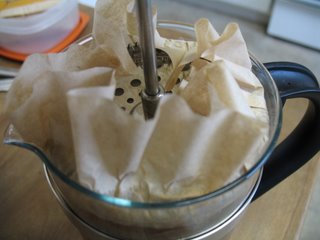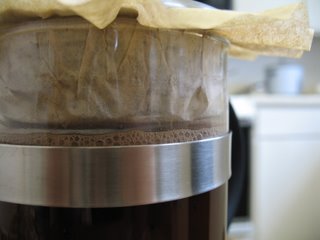I had rarely for many years used animal food, or tea, or coffee, &c.; not so much because of any ill effects which I had traced to them, as because they were not agreeable to my imagination. ... think of dashing the hopes of a morning with a cup of warm coffee, or of an evening with a dish of tea!
When I came across those lines in Walden, my reverence for Thoreau slipped, not quite a notch, but a few hairs at least. I love coffee. I look forward to the brew almost every afternoon. (I've never really been one to cry for a cup in the morning.)
I enjoy the ritual of making it, the anticipation while it cools just a little, and the hot dark taste as it goes down—not to mention the caffeine fix. That's what got me through the all-nighters I pulled in high school (and one double all-nighter) and college, though the boost I get is milder now.
The passage in which the above quote occurs discusses our animal life vis a vis our spiritual. Thoreau doesn't elaborate much here on his aversion to coffee, instead deliberating on the virtues of abstaining from meat, but it seems to stem from a concern with being enslaved to exotic appetites and addictions at the expense of higher pursuits. Later on he gets more economic:I did not use tea, nor coffee, nor butter, nor milk, nor fresh meat, and so did not have to work to get them; again, as I did not work hard, I did not have to eat hard, and it cost me but a trifle for my food.
This is not an issue with coffee anymore (except for those who drop $4+ at Starbucks everyday), though there are plenty of contemporary addictions this could be applied to—cars and oil spring to mind, as do disposable AA batteries for all of our portable electronic gadgets.
But I think Thoreau would have plenty more to say about coffee were he around today. I think he would criticize the mass production of inferior coffee products, the exploitation of the environment and people of coffee-producing countries, and our reduction of coffee to the merest utilitarian purpose of giving us a little more energy to work.
I was made aware of all of this and much more when I read Uncommon Grounds by Mark Pendergrast. I left the book at my school in China for the enlightenment of any coffee drinkers who might come that way, otherwise I'd quote from it.
But Pendergrast traces the history of coffee from the legend of Kaldi's dancing goats to the Starbuck's phenomenon of our time, and I highly recommend his book. He particularly focuses on the late 19th and 20th centuries, explaining the increasing intertwining of coffee with international relations, economics, and our domestic lives, as well as discussing how coffee was produced, packaged and sold over the years, and how that influenced the quality and taste of the coffee we drink.
Two things become apparent when reading this book:
Because of this, most of the coffee out there is no good, and most people don't really know what a good cup of coffee tastes like—and yet the big coffee companies rake in money every year.
Consider your canned coffee. Generally made from the cheaper, poorer-tasting Robusto beans, grown with pesticides and paid pennies for. Pre-ground long before it's brewed, so it rapidly loses flavor. And old after sitting on the shelf at the store and at home for weeks and weeks, possibly months or even longer. Coffee is a perishable commodity and needs to be brewed as soon after roasting and grinding as possible.
When I read this book, I had been regularly drinking Nescafe Gold instant coffee, as that was the easiest type of coffee to buy in China. After I finished, though, I vowed never to drink instant coffee again, or crappy regular coffee, even if nothing else were available (that's the only way to fight the "increase quantity, decrease quality" corporations). Generally I have succeeded—I can count on one hand the number of times since then I've had crappy coffee with a couple of fingers left over.
I also decided to seek out a better way to make coffee. The book mentioned the French press method as the best, but I never liked the grit that always gets through the filter mesh. I'd used drip coffee makers all my coffee-drinking life, but I knew I'd never had a truly excellent cup from one of those. But aside from a drip, the options available to me in China were nil (although I always saw these cool vacuum pots and other contraptions in the numerous cafés there).
I ended up rigging up something with clothes pins, a large glass jar, and some coffee filters I managed to find. It worked, and not too badly, but though the coffee I used was better than Nescafe Gold, it was not quite the taste I was looking for. (I bought it pre-ground at the French supermarket chain, Carrefour—whole beans, and grinders for them, were impossible to come by—but at least it was real.)
After I came back to America, my quest for a better coffee-brewing method was superseded by the job search and everything else needed to get on my own two feet here. I did get some good beans, though. I tried some organic, shade-grown Green Mountain coffee, as well as Whole Foods' organic store-brand coffee. Now I get Whole Foods' Allegro coffee since they get a newly-roasted batch of beans every week, and you can buy whatever amount you like—I like to get about a week's worth at a time.
But until recently I was still using a drip coffee maker, though the particular model I had was a step up from what I had used in the past. I was still not getting the brew I wanted, and I attribute this to two things: the inside pot of this particular model being difficult to access and hence difficult to clean, and the plastic filter basket.
Coffee always leaves a residue, and just rinsing with water, soap and water, or even coffee pot cleaners does not remove the residue. It has to be physically wiped off. (This is why work coffee is so bad—those huge thermal servers have years of crud inside them, and cannot be cleaned.) Filter baskets are hard to clean effectively what with all the ridges. Furthermore, plastic seems to absorb coffee odors very easily, and it's nearly impossible to remove them. If you use a drip, smell the filter basket and you'll see what I mean (or let me know what soap you use). These old odors get into your coffee every time you brew.
After things settled down in the other areas of my life, I renewed my quest, and decided to give the French press another try, but with a paper basket filter to keep all the grit out. I read somewhere online that this could not be done without the filter shredding, but lo and behold it works, and works very well.
The French press I have was a mere $14 at IKEA, and has no plastic parts (except the handle and plunger knob). It also meets my other requirement of it being easy to clean all surfaces that coffee comes into contact with. And 8-10 cup filters fit perfectly in the glass beaker.
After the water (just below boiling) is poured over the grinds, I place the filter in the beaker mouth, press it down a little with the plunger, and fold the rest of the filter out over the edge so I can push the lid down.
After 2-3 minutes (that's all the time you need) I lift the lid, fold the filter in, and slowly push down, pausing every 20 seconds or so to shake the press a little to scatter the grinds and allow for the easier flow of liquid through the filter. Pushing down too hard or quickly will cause the filter to tear.
I finish with a beaker full of excellent coffee, and pour it out so it doesn't brew further, and enjoy.
The only other thing I would like to get is a manual burr grinder to replace my electric blade whacker. The best burr grinders are made by Zassenhaus in Germany, but they've not exported any grinders to the US for about two years or so, hence they're hard to come by. I've been watching eBay, but every time a decent one is offered, the price ratchets up to $100+. Don't want one that badly. I've heard that blade whackers cause some flavor loss due to heat, but I just want to switch so I can get one less electronic gadget in my life.
Once I get there, I think I could brew some cups that even Thoreau might try, and hopefully he wouldn't exclaim afterwards, as he did in Walden, "Ah, how low I fall when I am tempted by them!"Bad coffee and how it got that way, and how to make it better.
Sunday, October 08, 2006
Better Coffee |
filed under: corporate US, do it differently |
Henry David Thoreau: Walden.
posted at 10:32 AM | 3 comments | view and post comments close comments
Subscribe to:
Post Comments (Atom)
